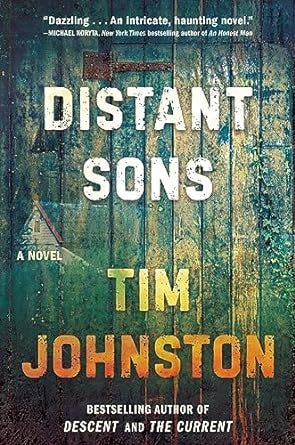Interrogation: Tim Johnson
Blood & Whiskey interview with the author of Distant Sons
Hello friends and readers,
A full Blood & Whiskey newsletter is coming in a few days, but first I wanted to share this interview with Tim Johnston, whose great new novel DISTANT SONS is out from Algonquin (available at Bookshop, Amazon, Barnes & Noble).
I had enjoyed two of Tim’s previous books (2019’s The Current and Descent, from 2015). The new book is the story of two wounded men, Sean and Dan, who meet accidentally in a small Wisconsin town, where decades earlier three boys had disappeared. Sean and Dan start working together on a remodeling job at the home of cranky-old Marion Devereaux. The troubled and troubling back stories and secrets of all three men trickle out slow and smooth. Tim’s writing — lovely, smart, dark — reminds me a bit of Peter Heller, Dennis Lehane, and Ivy Pochoda, who called the book “edgy, refined and complex.” Tim lives in Iowa City, Iowa.
I was a builder, and my son is a builder. I love reading the details of the trade… As a longtime carpenter, how does your trade and physical labor in general mesh with the sedentary life of writing stories? How do they relate to each other?
For a long time, for most of my adult life, in fact, I made a living as a carpenter—building and remodeling, mainly—so the sedentary life of writing stories was interstitial at best. I wrote when I could, and typically had to set the writing aside to go make my living physically in the world. Which I think was a good thing, especially when I was younger and still finding my way toward a more confident writing voice and more fully realized characters and stories; having to make a living as a carpenter slowed the whole writing process down. In the best of times I found, or created, a working schedule that allowed me to designate two or three waking hours of the morning for writing, and once I'd done the writing, going to work on other people's houses was far, far more enjoyable, and I would often continue writing in one part of my brain as another part oversaw the more rote activities of working with one's hands. In fact it was in the midst of doing all the finish work on a new house in the Colorado Rockies, entirely by myself up there for months on end, that I conceived of the idea for my novel Descent, a mental preoccupation that eventually became so insistent that I finally sat down and began to write (off the clock, of course). In a very literal sense, if I hadn't been a carpenter, I would never have written that novel—and by extension, since the main character of Distant Sons first appeared in Descent, I never would've written this novel either.
These days, and for the time being, I don't have to make my living doing anything but writing, but I also now own a hundred-year-old house, so there is always something I can be doing with my hands when I've been sitting long enough writing or revising. Also, now that carpentry isn't something I have to do, I'm beginning to enjoy it in a way I haven't in years. And that enjoyment is manifesting itself in the writing—the details of the trade, as you put it, that are so prevalent in Distant Sons.
Over time, I've come to understand that my best qualities as a carpenter, which were patience and attention to detail, are the same qualities that most influence how I write, and seem to serve me best.
Much of the plot occurs because someone gives a stranger a lift, and the book seems to dwell heavily on the question Sean asks early on: “Sean would later wonder why he didn’t just let the man go.” Did you ever hitchhike? (I did, a lot, and it once almost went wrong.)
I was never a big hitchhiker myself, but if there's a better scenario for creating drama and tension, and for dramatizing the Chance Encounter that Changes Everything, I'm not sure what it is, and I kinda love to write those scenes.
But now I gotta know: What almost went wrong?
[NT: Well, ok… I was a bit of a knucklehead in high school. I’d gotten suspended for drinking in the girls’ locker room with my friend Janey. One afternoon I hitchhiked to her house, got high (with a homemade Popeye shampoo bottle bong), then started hitchhiking home. A guy picked me up and I told him where I was headed, a good 30 minutes away. He offered to drive me the whole way if I’d, let’s say, spend some time with him. I told him to pull over, but he kept driving. When he slowed down to turn off the highway I jumped out, rolled into the grass, and ran to a nearby bar, where I called my exasperated mom for a ride. ]
More than a murder mystery I found the book to be a beautiful exploration of real life in the hard-working heartland, the so-called blue collar flyover states. (I see/feel the distinction where I live in Seattle, Arcteryx-land, while just 60 miles east is Carhartt-land). Is this an intentional effort to show readers the world you come from or admire, or just writing what you know?
I don't set out to show readers the world I come from—or in fact to show them anything in particular... more to place them in the place I'm imagining—but place is the extension of the characters I tend to find compelling enough to want to write about. It turns out that these characters mostly come from the kind of lands and small towns that I come from, which is a small college town in the Midwest (Iowa City, IA). As someone who has worked with his hands in the heartland, I feel a strong connection to such people, men and women. But I've also done my time in academia, as student and teacher, and I feel these two backgrounds—blue collar guy and college guy—simultaneously within me, and I do like to get both experiences in play, sometimes at odds with each other, in the storytelling realm. A retired high school science teacher, for instance, who quotes Shakespeare at his daughter's new carpenter suitor.
The novel had a fairly intricate plot, with scattered clues, multiple time periods and storylines, all twisty and entwined. As a builder, did you map it out, draft a blueprint? Or find your way?
Unlike building a house, I don't require a blueprint to begin building a novel. In fact the less I know about the finished product, the better. I prefer to assemble some various elements, such as characters, times and places, problematic and/or dangerous situations, and then see what kind of structure takes shape. Along the way I begin to notice pieces that fit together nicely, or work nicely against each other, and the longer I work on this construction, the more I begin to see the shape of it, those twists and turns. If I'm following my process naturally and not trying to force something to happen, then I'm more inclined to be surprised by the story, and this in turn makes for a more authentic surprise for the reader.
It's not my thing to try and complicate the plot... it's more like I've bought an Ikea table but there's no instructions and I'm trying to figure out all the pieces and how they go together to create some semblance of a sturdy and satisfying table, and it's going to take me a long time, plus a lot of revision and good editing, to get there.
One character tells himself: Behind every good, the bad waited its turn. Do you believe that?
I know I've been pretty lucky in life. I haven't had a lot of hardship that others have had, though as I get older I have become more acquainted with grief. But no one who's paying attention to what's going on in the world can believe that prosperity and peace and safety can be sustained. There are just too many bad actors, too much greed for money and power, too much natural and man-made (inseparable now, in my opinion) disaster at large in our world. Some writers look those big-picture problems square in the face in their fiction and non-fiction, but that feels like too much for me. I'm better at concentrating my focus on individuals whose trials might be symbolic of larger ills, but which must be faced in the most personal and immediate of ways. In the end, as fiction writer and human, I'm also inclined to believe that behind every bad, some measure of good waits its turn.
[NT: 👍🏻]
I’d seen you refer elsewhere to Hemingway’s Islands in the Stream as a favorite. Why that one?
I think because I'd never read it until a few years ago, and it surprised me. I was really moved by the writing, and the story, which centers on a painter who has three young sons he loves intensely, each distinct in his personality and who break his heart with their young strivings, and who, very suddenly, are all gone forever from his life. The passages that describe the father's grief, or very pointedly don't describe his grief, are heartbreaking. And in the last section of the book, the story turns improbably into a cat-and-mouse World War II adventure with a German U-boat crew on the run from the father and his crew, a ragtag group of men who have become, figuratively speaking, his sons, grown up and each with his own distinct personality. There's just so much love and grief in the story... and of course those clean, no-nonsense Hemingway sentences.
Over time, I've come to understand that my best qualities as a carpenter, which were patience and attention to detail, are the same qualities that most influence how I write, and seem to serve me best.
If I'm following my process naturally and not trying to force something to happen, then I'm more inclined to be surprised by the story, and this in turn makes for a more authentic surprise for the reader.
Thanks for reading. More “Interrogation” interviews: here.
If you know others who might enjoy my Blood & Whiskey newsletter, please:
Later this week I’ll review Tim’s book and others, share some cocktail-book pairings and more from the Portland Book Festival, which I recently attended.
Till then…
-Neal
Find me @ Instagram; sometimes Facebook, Twitter, LinkedIn, Goodreads
And it's a battered old suitcase
To a hotel someplace
And a wound that will never heal
No prima donna, the perfume is on
An old shirt that is stained with blood and whiskey…
-Tom Waits, “Tom Traubert’s Blues”





